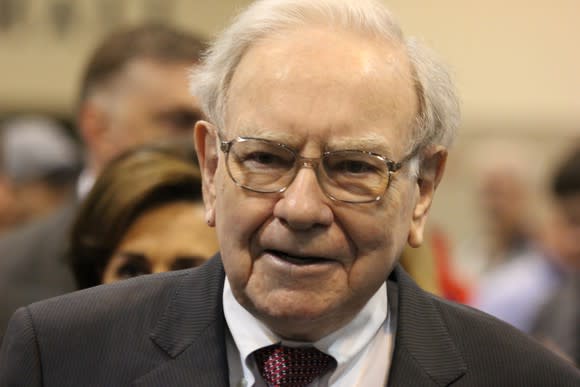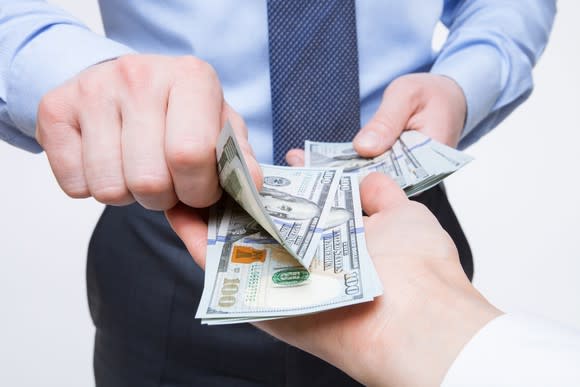10 Highest-Yielding Warren Buffett Stocks
There's no doubt that Warren Buffett is a big fan of dividends. In fact, the majority of the companies he buys on behalf of Berkshire Hathaway (NYSE: BRK-A) (NYSE: BRK-B) offer a cash payout to their shareholders. But which of Buffett's dividend stocks offer the highest yield right now? To find out, I made a list of all of the dividend stocks in his portfolio and then ranked them by yield.
Here's a look at the top 10.
Company | Dividend Yield |
|---|---|
STORE Capital (NYSE: STOR) | 5.1% |
Verizon Communications (NYSE: VZ) | 4.9% |
General Motors (NYSE: GM) | 4% |
Sanofi (NYSE: SNY) | 4% |
Kraft Heinz (NASDAQ: KHC) | 3.8% |
International Business Machines (NYSE: IBM) | 3.7% |
Coca-Cola (NYSE: KO) | 3.6% |
Procter & Gamble (NYSE: PG) | 3.5% |
United Parcel Service (NYSE: UPS) | 3.3% |
Phillips 66 (NYSE: PSX) | 2.9% |
Data source: Finviz. Dividends are as of March 19, 2018.
Just because a stock is on this list doesn't make it an automatic buy. Instead, let's take a closer look at each of his holdings to see if we can tease out what Buffett currently thinks of each position.

Image source: The Motley Fool.
Buffett's favorite REIT
STORE Capital is probably the one business on this list that most investors haven't heard of. Buffett started buying shares of this real estate investment trust (REIT) back in 2017 and currently owns about 10% of the company. STORE's business model is to buy freestanding buildings and then lease them out to service-oriented retailers (think auto service centers, health clubs, and restaurants).
Given the recent struggles of the retail industry, you might assume that this business isn't fairing too well right now. In fact, the opposite is true. The company's occupancy rate at the end of 2017 was 99.6%, which a remarkably high number.
STORE is able to keep this rate so high because it takes a lot of time to vet its tenants before leasing them space. What's more, the company also makes its tenants sign multiyear contracts that include annual rent increases and also demands that they regularly share their financial statements. These factors have allowed STORE to thrive even as scores of retail concepts have gone belly up.
A telecommunications giant
Buffett first started buying shares of Verizon back in early 2014. At the time, he was likely attracted to the company's dominant industry position and its long history of paying out a growing dividend to shareholders. When adding in the growth potential of its FiOS business, it is understandable why Buffett thought that he had a winner on his hands.
Unfortunately, Verizon's stock has badly lagged the market since he became a shareholder. One reason for the underperformance is that U.S. wireless market is saturated and the largest players have been battling each other for market share by starting a pricing war. Another is that cord-cutting has become a major headwind for the FiOS business.
In an effort to combat these challenges Verizon has spent billions to gobble up internet properties like HuffPost, Yahoo!, and AOL. However, it is unclear whether or not these acquisitions will be enough to overcome the headwinds faced by its core business.
Given that Buffet's original thesis for buying Verizon has largely been busted, it isn't surprising to see he has reduced his position in the company to just $49,000 (that's not a typo).
An auto turnaround
The auto sector has historically been a difficult place for investors to make money, but that didn't stop Buffett from taking a meaningful position in General Motors back in 2012. Buffett likely became convinced that the company's renewed focus on metrics that actually matter would combine with the pent-up demand for automobiles to turn GM into a winning investment. It also probably didn't hurt that the company consistently trades at a low price-to-earnings ratio and offers up a fat dividend yield.

Image source: Getty Images.
General Motors' stock has risen consistently since Buffett first started buying shares in 2012, so his investment in the company should be viewed as a modest success. However, concerns have started to mount that we have finally reached peak auto sales in the U.S., which, if true, isn't great news for General Motors' investors moving forward. What's more, autonomous vehicles and electric cars both represent huge disruptions to the auto industry and it isn't yet clear whether or not entrenched companies like General Motors will be able to successfully adapt to the changes. Given the challenges, perhaps it is understandable why Buffett has been trimming his position in the automaker recently.
France's big pharma
Large pharmaceutical companies like Sanofi have long been viewed as a safe haven for investors since demand for drugs remains steady in good times and in bad. That factor -- along with the company's generous dividend yield -- likely appealed to Buffett when he started buying the stock way back in 2006. At the time Sanofi's revenue and profits were growing nicely on the back of a few megablockbuster drugs such as Lantus, Plavix, and Lovenox.
Unfortunately, the good times didn't last very long. Sanofi struggled to grow in the years following Buffett's purchase as the company saw its most profitable drugs lose their patent protection. Sanofi's pipeline didn't produce new blockbusters at a fast enough pace to replace that lost revenue, which caused the company's stock to languish.
Sanofi's Board brought in a new CEO in 2014 to shake things up and get the company's growth engine back on track, but it was too little to late to turn Buffett's investment into a winner. Buffett has largely admitted defeat with Sanofi as he has been steadily parting ways with his shares in recent years.
Two food giants team up
Buffett was a key player in the megamerger that took place between Kraft Foods Group and H.J. Heinz in 2015. Buffett teamed up with 3G Capital to help finance the deal and wound up creating the fifth largest food and beverage company in the world. Berkshire ended up with a 27% stake in the newly formed company.
Buffett has long favored investing in consumer staples giants like Kraft Heinz for several reasons: First, they sell low-priced goods that are purchased in all economic conditions. Second, their vast distribution networks and marketing muscle creates a durable competitive advantage. Lastly, these types of business tend to have pricing power that makes them excellent investments over the long run.
However, Buffett's huge bet on Kraft Heinz's hasn't been paying off recently. One reason for the underperformance is that consumer preferences are changing rapidly, especially in North America where the company derives the bulk of its sales. In response to those changes, some retailers are pulling back on Kraft Heinz's shelf space and devoting more to upstart brands. That headwind is capping the company's revenue growth and has caused Wall Street to put Kraft Heinz's stock in the discount bin.
Despite the challenges, Buffett hasn't parted ways with any of his shares, so he clearly still believes that this company's future remains bright.
A tech bet gone awry
Buffett famously avoided the tech sector for decades, so investors scratched their heads when the news broke that he invested billions in IBM back in 2011. At the time IBM's former CEO Sam Palmisano had boldly promised to double the company's earnings per share from $10 in 2009 to $20 by 2015. When combined with the company's long history of delivering for shareholders and cheap valuation, it isn't hard to figure out why Buffett smelled opportunity.

Image source: Getty Images.
Unfortunately, Buffett's huge vote of confidence for IBM looks to have been very poorly timed. Former CEO Palmisano was replaced by current CEO Ginni Rometty in 2012 and she has taken the company in an entirely different direction. Rometty has sold off low growth business and has plowed R&D dollars into growing the company's cloud and data-analytics businesses. These moves made it impossible for IBM to deliver on its $20 in EPS target by 2015, so CEO Rometty ended up abandoning that target. Wall Street didn't take kindly to the about-face so it is no surprise to see that Buffett's position in the company has drastically underemployed the market.
Fast-forward to today: Buffett has officially admitted defeat, selling 94% of his remaining IBM stock in the fourth quarter of 2017. This busted investment should serve as a lasting reminder that even great investors will swing and miss from time to time.
A classic Buffet bet
Perhaps no other business screams "Buffett investment" more so than Coca-Cola. The iconic carbonated drink giant has been a multi-bagger for Buffett since he first starting buying shares in the late 1980s. What's more, the company has boosted its dividend payment for 55 years in a row, which is a remarkable achievement.
However, there's no doubt that cracks are starting for form in the long-term bull case for owning this company. The world is starting to wake up to the fact that drinking sugary beverages isn't good for their health, which has put a lot of pressure on Coca-Cola's top-line growth in recent years. That's why the company has been so willing to experiment with new types of beverages in recent year.
Despite the revenue headwind, Coke's bottom-line has continued to lurch forward in recent years thanks to buybacks and cost-cutting measure. However, those methods might not lead to sustainable growth over the long-term.
Buffett probably still believes in the long-term potential of this business because he hasn't trimmed any of his Coke stock yet. However, that could be because doing so would result in a massive tax bill for Berkshire due to his extremely low cost basis. Whether or not Buffett thinks that Coca-Cola will still be a market-beating investment from here remains a mystery.
Leftovers from an investment switch-a-roo
On its surface, consumer staples giant Procter & Gamble might seem like another classic Buffett stock. A few years ago Buffett owned nearly $4 billion worth of P&G, which qualified it as one of Berkshire's largest holdings.
However, you might be surprised to learn that the Oracle never actually purchased shares of P&G directly. Instead, Berkshire's large position in P&G was a result of it buying out razor blade maker Gillette back in 2005. Berkshire was one of Gillett's largest shareholders at the time and he wound up with a large chunk of P&G stock as a result of the transaction.

Image source: Getty Images.
While Buffett made out like a bandit from the buyout he actually decided to part ways with the vast majority of P&G stock a few years. Buffett exchanged a large portion of his stock for complete ownership of P&G's Duracell battery business, which was a tax-efficient move for Berkshire's shareholders. The transaction left Buffett with only about $25 million in P&G stock, which Berkshire still holds to this day.
A transportation giant
Buffett first purchased shares of United Parcel Service back in 2006. The package-delivery company enjoys duopoly status with FedEx and has a long history of rewarding shareholders with dividend payments and buybacks. What's more, the growth in e-commerce sales has been a tailwind that this company should be able to ride for decades to come.
Given these factors, you might assume that Buffett's investment in UPS is substantial; unfortunately, that's not the case at all. His total investment in UPS is currently just over $7 million, which isn't much in the grand scheme of things.
One potential reason for Buffett's skittishness is that e-commerce growth is a double-edged sword. On the one hand, it represents a great long-term trend for the company to ride. On the other, the company is struggling to keep up with the additional capacity demands and is experiencing margin pressure. There's also the worry that Amazon.com is going to bypass the delivery service giants altogether and build out its own distribution network.
A rare energy bet
Buffett doesn't own stock in many publicly traded energy companies, but one prominent exception is Phillips 66. Buffett has invested billions into the refining giant since he first started buying shares in 2012.

Image source: Getty Images.
While Buffett has done pretty well with his Phillips 66 investment, investors recently learned that he is selling $3.3 billion worth of stock back to the company. You might think the move represents dissatisfaction with the business, but Buffett actually stated that it's designed to bring his ownership stake below the 10% level, so he no longer has to deal with additional regulatory headaches. In fact, he affirmed that he continues to like the refiner's prospects, and plans on holding his remaining position in the company for the long term.
Are any of these worth buying today?
Dividend-seeking investors might be tempted to simply mirror Buffett's portfolio by buying shares of all ten of these companies today. However, after reviewing his holdings and recent actions in detail it is clear to me that many of these business face growth challenges that might not make them ideal holdings.
However, I think that STORE Capital and Philips 66 are two notable exceptions. STORE Capital remains in growth mode and looks to have a massive amount of room left for future expansion. With a rock-solid business model in place, STORE's dividend looks poised for growth.
Philips 66's future also looks strong thanks to the recent recovery in energy prices. When adding in several new projects that are coming online, this stock looks like another dividend dynamo for investors to get to know.
Overall, if you're after high-yield stocks that have Buffett's seal of approval, I'd start my due diligence with those two businesses.
More From The Motley Fool
John Mackey, CEO of Whole Foods Market, an Amazon subsidiary, is a member of The Motley Fool's board of directors. Brian Feroldi owns shares of Amazon and has the following options: short January 2019 $185 puts on IBM, short January 2019 $180 puts on IBM, long January 2020 $170 calls on IBM, and short January 2020 $170 puts on IBM. The Motley Fool owns shares of and recommends Amazon, Berkshire Hathaway (B shares), and Verizon Communications. The Motley Fool is short shares of IBM. The Motley Fool recommends FedEx. The Motley Fool has a disclosure policy.
